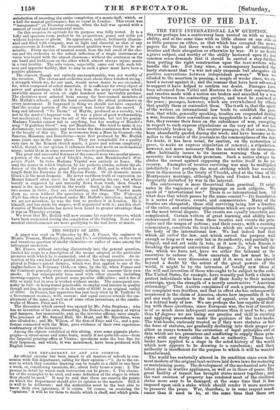THE SOCIETY OF ARTS.
A paper was read on Wednesday by Mr. A. Fraser, the engineer to Messrs. Truman, Hanbury, Buxton, and Co.'s establishment, on the vexed and vexatious question of smoky ehimnies—or rather of some among the infrequent smokeless. Mr. Fraser, without entering discursively into the general question, limited his scope to a description of the means adopted at the particular premises with which he is connected, and of the actual results. An in- vention of his own had had a partial success; but the apparatus now em- ployed is Dukes's patent furnace, which was first applied to one of the engine-boilers in February 1848,—a time, by the by, when France and the Continent generally were strenuously refusing to consume their own smoke. It has subsequently been used with other utensils, including brewing-coppers, which present some peculiar difficulties; and a fire of fifty or sixty feet in area is worked without smoke. The consequent eco- nomy in fuel—it being found practicable to employ coal inferior in quality though not less in quantity—is in the ratio of 8338/. to an original outlay of 3000/. In France, this apparatus has just been tried by M. Taillefer in a Government steamer, with success ; and equal success attends the em- ployment of the same, as well as of some other inventions, at the candle- works of Messrs. Price and Co.
The discussion which ensued was opened by Mr. John Stephens ; who has an invention of his own, discarding, like Dukes's, the agency of valves and dampers, but immoveable, and, as the inventor affirms, more simple. The processes of Mr. Samuel Hall, Mr. Hunt, and Mr. Hazeldine, were also alluded to ; and Mr. Wilson, of the firm of Price and Co., and a gen- tleman connected with the Mint, gave evidence of their own experience confirmatory of the lecturer's.
Among the objects exhibited at this sitting, were some gigantic photo- graphs—a street-scene and some busts, nearly if not quite life-size—from the Imperial printing-office at Vienna ; specimens none the less fine for their largeness, and which, it was mentioned, have been produced with English lenses.




































 Previous page
Previous page